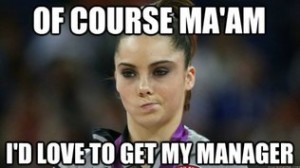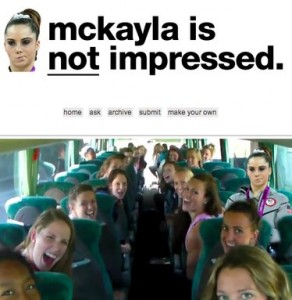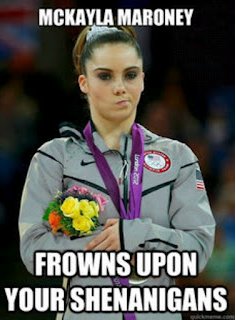Brands
McKayla Maroney Scowl Meme: The Unpredictable Life of Viral Content
Oh, McKayla Maroney — you and your scowl would just not go away.
 It’s safe to say that Maroney is now the de facto champion of every soul that has ever felt the frustration of coming in second best (even if that’s not what she meant to be).
It’s safe to say that Maroney is now the de facto champion of every soul that has ever felt the frustration of coming in second best (even if that’s not what she meant to be).
Maroney’s silver-medal frown swiftly became indelibly etched into the cultural memory of London’s 2012 Summer Games.
What does her sour-puss legacy tell us about content?
Let’s take a look at the meme that went viral, and ask an expert to weigh in on what it means for brands looking to create content. It’s the ‘Maroney Scowl’ installment of The Content Strategist‘s post-Olympics lap.
Context is Dead: Long Live Context
Maroney-Scowl Axiom No. 1: It does not matter how the action that becomes a meme actually happened, or what its doer intended it to mean.
Truth is, nobody cares whether Maroney was really scowling, or whether her nose just itched.
 The lesson of the meme in question is in how content — the photo of her with her lips pursed — is repurposed. Whatever the users desire is what will be revealed. Or, in other words, the Internet public’s needs will win out over the brand’s, or individual’s, intended message. The McKayla Is Not Impressed Tumblr contains a vast assortment of variations on the theme.
The lesson of the meme in question is in how content — the photo of her with her lips pursed — is repurposed. Whatever the users desire is what will be revealed. Or, in other words, the Internet public’s needs will win out over the brand’s, or individual’s, intended message. The McKayla Is Not Impressed Tumblr contains a vast assortment of variations on the theme.
In this case, people apparently wanted to, at once, both gently chide a champion for displaying a moment of human nature and they also wanted to use Maroney’s unguarded expression to create their own messages about what is funny, infuriating, and ultimately maybe kind of disappointing about even the most interesting moments of life.
What this tells writers and content marketers is that, on the one hand, online content doesn’t have to rely on context. And context is whatever web users decide that it will be.
Content Makers Beware: The Meme Never Said It Was Your Friend
The Maroney scowl has real-world implications for content makers.
The Internet is by nature interactive. And sometimes it is reflexive. Design something and it could leave your organizational control. Images and quotes can be re-contextualized, hypercontextualized, altered, and disguised.
 And that’s a risk that every brand, every online writer and creator of images, must keep in mind. Beware the meme, to a certain extent.
And that’s a risk that every brand, every online writer and creator of images, must keep in mind. Beware the meme, to a certain extent.
“Most of what ‘takes on a life of its own’ online is probably negative, and won’t help the company much,” said Alex Goldfayn, a marketing expert who recently published Evangelist Marketing, about how some online brand giants seem to understand consumers in better ways than others.
But in the case of Maroney, he said that in his estimation, her “brand” came out unscathed.
“The scowl ended up being a humorous and sweet image,” Goldfayn said. “But it could have just as easily cost this athlete all of her endorsements.”
She dodged that bullet, it seems, with a combination of good humor and aplomb, showing up shortly after the meme caught fire and giving the scowl for fun on The Colbert Report.
The Life-of-Its-Own Problem: Courting the Meme
It’s not enough to take Maroney’s gentle landing as the lesson. Another point to make is that Maroney did not try to become a meme. She wasn’t, as far as we can tell, courting all the extra attention that she got.
In that circumstance, there’s a lesson about self-nomination, and self-consciousness. When it comes to branding and marketing your brand online (or anywhere, really, but especially online), a very real problem is the following, as Goldfayn suggests: Consumers are often looking for the barbs in every meme.
 Push too hard, or take too many risks in reaching for the public eye, and you might just get the wrong end of the whip.
Push too hard, or take too many risks in reaching for the public eye, and you might just get the wrong end of the whip.
“Most of the content that companies put out on social media doesn’t catch on,” he said. “It’s too corporate and promotional. Despite the money invested — and the myriad social-media marketing agencies that have popped up — there is no ‘conversation’ with customers. Bad, embarrassing material often goes viral. The good stuff isn’t interesting, so it doesn’t catch on.”
So, if that’s the risk inherent in being a brand in a meme-able world, where does this leave us?
It leaves us essentially going back to having to learn from our Maroney.
That is, be yourself, but be aware of what you’ve done. If your scowl becomes the the new face of the Internet — for a moment, anyways — act cool and work it. Try to treat your Maroney-scowl moment with some humility and a sense of fun.
In the well-managed meme, even missing out on gold can mean redemption.
Get better at your job right now.
Read our monthly newsletter to master content marketing. It’s made for marketers, creators, and everyone in between.




